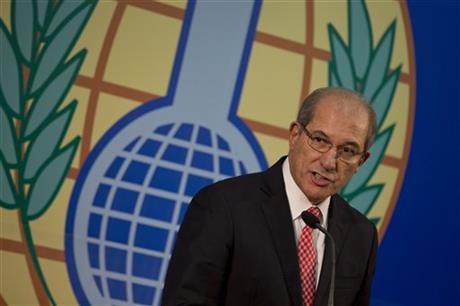
By MIKE CORDER
Director General Ahmet Uzumcu of the Organisation for the Prohibition of Chemical Weapons, OPCW, gives an update on the the chemical watchdog’s verification and destruction mission in Syria during a press conference in The Hague, Netherlands, Wednesday Oct. 9, 2013. (AP Photo/Peter Dejong)
THE HAGUE, Netherlands (AP) — International inspection teams overseeing the destruction of Syria’s chemical weapons will have to negotiate cease-fires to access some sites, officials closely involved with the mission said Wednesday, in a clear indication of the risks and difficulties of the unprecedented disarmament plan.
The very fact that the joint United Nations and Organization for the Prohibition of Chemical Weapons team will have to persuade Syrian government forces and rebels to put down their arms highlights how hard it will be for the international effort to rid Damascus of its poison gas stockpile by a mid-2014 deadline.
OPCW Director-General Ahmet Uzumcu told reporters in The Hague the timeline was tight but “not unrealistic.” He said inspectors have to visit more than 20 sites in coming days and weeks. Since the mission started last week, they have been to one location; they are expected to inspect a second site near Damascus on Wednesday.
This is the first time the global organization that polices the Chemical Weapons Convention has sent its inspectors and analytical chemists into a raging civil war and their security is a major concern amid ongoing fighting between President Bashar Assad’s forces and various rebel groups. The war has already left at least 100,000 people dead.
On Wednesday, rebels overran a military post near the southern city of Daraa, according to the Britain-based Syrian Observatory for Human Rights activist group. Opposition fighters late last month also captured a nearby military base that previously served as the customs office on the outskirts of Daraa.
“If we can ensure some cooperation by all parties and if some temporary cease-fires … can be established in order to permit our experts to work in a very hostile environment, I think the targets could be reached,” Uzumcu said in his first public remarks about the mission.
The joint United Nations-OPCW mission entered Syria last week and has already overseen the first stages of destruction of Syria’s chemical arsenal.
Another senior OPCW official, Malik Ellahi, said that while cease- fires will be vital for some locations, Damascus has consolidated many of its weapons into secure locations away from rebel-held territory.
“So far what we have been told is that most of the sites and facilities that we need to inspect are in government control,” he said.



